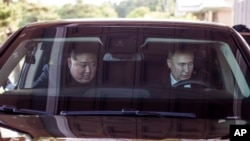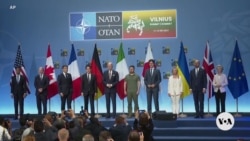The NATO summit scheduled for this week will include a discussion among the allies about strengthening security ties with South Korea and Japan against deepening military cooperation between Russia and North Korea, experts said.
The leaders of 32 NATO members will convene in Washington July 9 to 11 to discuss ways to provide continued military support to Ukraine to help it defend itself against Russia, which invaded more than two years ago.
Australia, Japan, New Zealand and South Korea — sometimes referred to as the Indo-Pacific 4 or IP4 — are invited to the NATO summit. The United States, Japan and South Korea plan to meet on the sidelines of the summit.
Among the items that analysts expect NATO to discuss with Japan and South Korea is the growing military cooperation between Russia and North Korea.
"The Russian-North Korean agreement is a problem for both NATO countries and for the countries in the Northeast Asia," said Bruce Bennett, a senior defense analyst at the RAND Corporation.
"I expect that it will be discussed at this meeting. It may become a critical aspect of the meeting, if, by that time, intelligence is saying that North Korea is sending many military personnel to support Russia in Ukraine," Bennett said.
After Russian President Vladimir Putin and North Korean leader Kim Jong Un signed a mutual defense pact in Pyongyang last month, some speculated that North Korea could dispatch army engineers to Russian-occupied Donetsk to rebuild the war-torn region.
Pentagon press secretary Major General Patrick Ryder said at a press conference on June 25 that the U.S. is keeping an eye on a possible dispatch of troops but warned North Korea about sending military forces, saying they would be "cannon fodder in an illegal war against Ukraine."
North Korea on June 27 renewed its support for Russia's war against Ukraine, saying, "We will always be on the side of the Russian army" in "the war of justice."
Both Washington and Seoul have estimated that Pyongyang sent about 10,000 containers of munitions to Russia. Moscow and Pyongyang denied arms exchanges between the two.
But in the defense pact that Putin and Kim signed last month, they agreed to set up ways to bolster their defense capabilities and openly announced possible military and technical cooperation.
"NATO members will discuss the implications of closer Russia-North Korea relations and how best to respond, including in terms of risks and opportunities," said Matthew Brummer, a professor at the National Graduate Institute for Policy Studies in Tokyo.
"Risks primarily include material outcomes, such as how North Korea involvement will come to bear on warfighting in Ukraine. But there are also opportunities to be exploited, including how to use increased North Korea involvement to drive a wedge between China and Russia," he said.
"The reemerging axis between China, Russia and North Korea has most certainly precipitated the security link between Europe and Asia. As a result, I expect increased NATO involvement in East Asia, especially with Japan, which is the world's greatest latent military power," Brummer said.
Beijing said that it is keeping "a close eye" on the NATO summit and that it hopes the summit does not "target any third party."
Liu Pengyu, a spokesperson for the Chinese Embassy in Washington, told VOA on Tuesday that "the Asia-Pacific lies beyond the geographical scope of the North Atlantic" and that "NATO's attempt to make eastward inroads into the Asia-Pacific will inevitably undermine regional peace and stability.”
"The countries and people in this region are on high alert against this and firmly oppose any words or actions designed to bring military blocs into this region and stoke division and confrontation," he said.
The U.S. State Department did not respond to an inquiry by VOA's Korean Service seeking a response to Beijing's comments.
Luis Simon, director of the Elcano Royal Institute in Brussels, Belgium, said he would not rule out NATO countries conducting joint military exercises with its East Asian partners "in the Korean Peninsula context rather than in a China context" because it offers "diplomatically an easier entry point."
At the same time, he said, "It will be more with NATO allies rather than the NATO as a whole because NATO as a whole is very clear about being laser focused" on defending Ukraine.
The Japan Air Self-Defense Force announced on June 25 that it will hold a series of joint drills in July with Germany, Spain and France — all NATO members.
David Maxwell, vice president of the Center for Asia Pacific Strategy, also said that bilateral arrangements between South Korea and individual NATO countries could be possible as "a number of NATO countries are member states of the United Nations Command."
The U.N. Command is a multinational military body created during the Korean War of 1950-53 to defend against North Korean aggression.
Some analysts said there are limits to NATO's involvement in the Indo-Pacific.
"Most of the countries in NATO are focused on the Atlantic area, and those who have projection capabilities" that can go beyond that "have rather small ones," said Barry Posen, Ford international professor of political science at MIT.
William Ruger, a nonresident senior fellow at Defense Priorities, said U.S. "capabilities, material and policy bandwidth" are not sufficient to deal with the security of both Europe and Asia.








